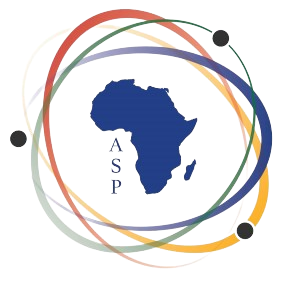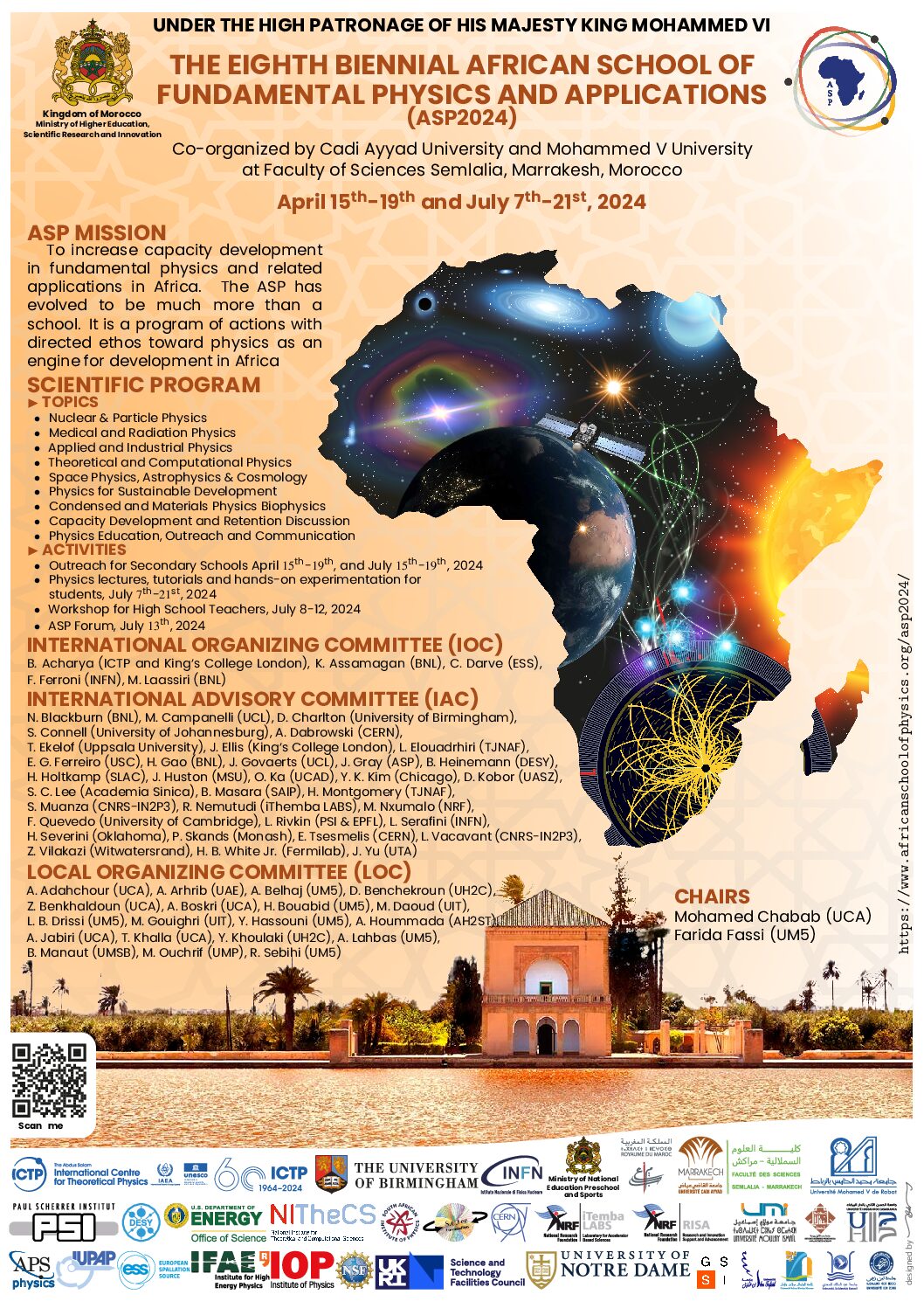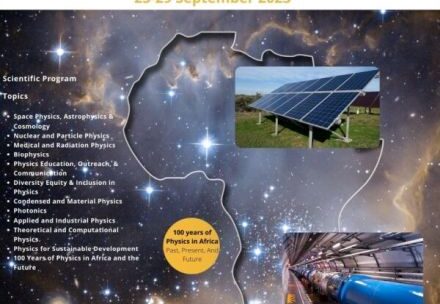The 8th African School of Fundamental Physics and Applications, ASP2024 is planned in Marrakesh, Morocco, on April 15-19 and July 7-21, 2024.
Local Organizing Committee (LOC)
Mohamed Chabab (UCA, Chair), Farida Fassi (UM5, Chair), Yassine Hassouni (UM5), Alaaeddine Lahbas (UM5), Mohamed Gouighri (UIT), Youssef Khoulaki (UH2C), Zouhair Benkhaldoun (UCA), Abdesslam Arhrib (UAE), Mohammed Daoud (UIT), Rajaa Sebihi (UM5), Driss Benchekroun (UH2C), Abdeslam Hoummada (AH2ST), Mohamed Ouchrif (UMP), Abderrahim Adahchour (UCA), Adil Belhaj (UM5), Lalla Btissam Drissi (UM5), Abdelkrim Boskri (UCA), Tarik Khalla (UCA), Bouzid Manaut (UMSB), Hamid Bouabid (UM5)
International Organizing Committee (IOC)
B. Acharya (ICTP and King’s College London), K. Assamagan (BNL), C. Darve (ESS), F. Ferroni (INFN), M. Laassiri (BNL)
International Advisory Committee (IAC)
N. Blackburn (BNL), M. Campanelli (UCL), D. Charlton (University of Birmingham), S. Connell (University of Johannesburg), A. Dabrowski (CERN), T. Ekelof (Uppsala University), J. Ellis (King’s College London), L. Elouadrhiri (TJNAF), E. G. Ferreiro (USC), H. Gao (BNL), J. Govaerts (UCL), J. Gray (ASP), B. Heinemann (DESY), H. Holtkamp (SLAC), J. Huston (MSU), O. Ka (UCAD), Y. K. Kim (Chicago), D. Kobor (UASZ), S. C. Lee (Academia Sinica), B. Masara (SAIP), H. Montgomery (TJNAF), S. Muanza (CNRS-IN2P3), R. Nemutudi (iThemba LABS), M. Nxumalo (NRF), F. Quevedo (University of Cambridge), L. Rivkin (PSI & EPFL), L. Serafini (INFN), H. Severini (Oklahoma), P. Skands (Monash), E. Tsesmelis (CERN), L. Vacavant (CNRS-IN2P3), Z. Vilakazi (Witwatersrand), H. B. White Jr. (Fermilab), J. Yu (UTA)
The program includes:
- Two-week intensive engagements with students, July 7–21, 2024
- One-week training workshop for high school teachers, July 8–12, 2024
- A forum for discussion with African policymakers in physics education and research, July 13, 2023
- One-week physics outreach to high school learners, April 15-19, 2024
Venue
Faculty of Science Semlalia, Cadi Ayyad University
Bd. Prince My Abdellah, B.P. 2390, 40000 Marrakech
Tél : (+212) 5 24 43 46 49
Fax : (+212) 5 24 43 67 69
fssm@uca.ma
Map Location
Practical Info
Passport and Visa Information
Visa-Free Entry:
The following countries do not need a visa for visits of up to 90 days. Algeria, Andorra, Argentina, Australia, Austria, Bahrain, Belgium, Brazil, Bulgaria, Burkina Faso, Canada, Chile, China, Colombia, Cote d’Ivoire, Croatia, Cyprus, Czech, Denmark, Estonia, Finland, France, Germany, Greece, Hong Kong(30 days), Hungary, Iceland, Indonesia, Ireland, Italy, Japan, Kuwait, Latvia, Libya, Liechtenstein, Lithuania, Luxembourg, Maldives, Malta, Mexico, Monaco, Netherlands, New Zealand, Niger, Norway, Oman, Peru, Poland, Portugal, Puerto Rico, Qatar, Romania, Russia, Saudi Arabia, Senegal, Singapore, Slovakia, Slovenia, South Korea, Spain, Sweden, Switzerland, The Philippines, The United Kingdom, United States of America, Tunisia, Turkey and United Arab Emirates.
Nationals from Republic of Congo, Guinea and Mali must obtain an ETA before entering Morocco.
Visa Exemptions:
For a comprehensive list of countries that benefit from visa exemptions, please visit Countries not requiring visa to enter Morocco.
E-Visa & AEVM Applications:
If your travel to Morocco necessitates an E-Visa or AEVM (Automated Electronic Visa Management) application, ensure you apply and track your application via the Accès Maroc portal.
Need Visa Assistance?
Should you have questions or require assistance with Morocco’s visa procedures, our dedicated team is ready to assist and guide you. Reach out to us at: asp2024-loc(at)cern.ch.
About Marrakesh
Marrakesh was founded in 1062 by the Almoravids, the ruling dynasty at the time, although the area was inhabited since Neolithic times by Berber farmers. It then became the capital of the Almohad caliphate, which succeeded the Almoravids and sprawled across Spain and Africa. Marrakesh was the capital of the caliphate for the following two centuries. This is why it is counted among the Four Imperial Cities of Morocco, together with Fez, Meknes and Rabat (that is the capital of Morocco now). The walls surrounding the city, which were built in 1122–1123, as well as many buildings across Marrakesh were constructed in red sandstone have granted the city the nickname of “Red City” or “Ochre City”.
Marrakesh Weather:
Marrakesh climate is hot and semi-arid.
- Winters are mild, with temperatures that never fall below 12°C (54°F) during the day and though nights can get as cold as 6°C (43°F).
- Summer (June to September) is hot, reaching an average of 27°C (81°F) and peaking at 37°C (98°F) in July, the hottest month.
- Spring (March to May) and autumn (October and November) are ideal times to visit, with warm weather averaging 19°C (66°F). Spring is slightly wetter, but rainfall remains low.
Navigating in Marrakesh:
- Taxis: The most popular mode of transportation in Marrakesh, taxis are perfect for reaching landmarks, especially the iconic Jamaa el Fna Square.
- Bicycle and Motorcycle Rentals: For those looking to navigate the city at their own pace, Marrakesh offers bicycle, scooter, and motorcycle rentals. Médina Bike Marrakech has multiple parking locations throughout the city, open 24/7 for your convenience.
- Horse-Drawn Carriage Rides: Experience Marrakesh’s charm with a traditional horse-drawn carriage ride. Ideal for short trips, these carriages offer a unique perspective of the city’s narrow alleys and bustling medinas. If you’re up for it, walking tours of the medina are also a fantastic way to immerse yourself in the local atmosphere.
Explore More of Marrakesh:
For an in-depth guide to Marrakesh and its attractions, consider visiting the official website of the Moroccan National Tourism Office (MNTO). It’s a treasure trove of information, aimed at presenting the best of Morocco to global travelers. Visit Marrakesh with MNTO
Currency and Means of Payment
Official Currency:
- Unit: The Moroccan dirham (abbreviated as MAD or DH).
- Banknotes: Available in denominations of 20, 50, 100, and 200 DH.
- Coins: Denominations include 0.50, 1, 2, 5, and 10 DH, as well as 1, 5, 10, and 20 centimes.
Currency Exchange:
- Where to Exchange: Currency can be exchanged at airports, select hotels, banks, and exchange offices located in tourist squares across Moroccan cities.
- Documentation: A passport is typically required for currency exchange transactions.
Payment Methods:
- Cash: While many establishments accept credit cards, some places, especially those that don’t offer card payment options, prefer payment in dirhams.
- Credit Cards: Major international cards like Visa and MasterCard are widely accepted in hotels, certain restaurants, shops, and petrol stations. When using a credit card, the applied exchange rate is the prevailing rate. The commission, usually around 1%, varies based on the issuing institution.
- ATMs: ATMs are conveniently located throughout Morocco. Consult with your bank to identify compatible ATMs for your card.
The value of the exchange rate in real time:
1 USD ≈ 10.12 MAD
1 Euro ≈ 10.83 MAD


